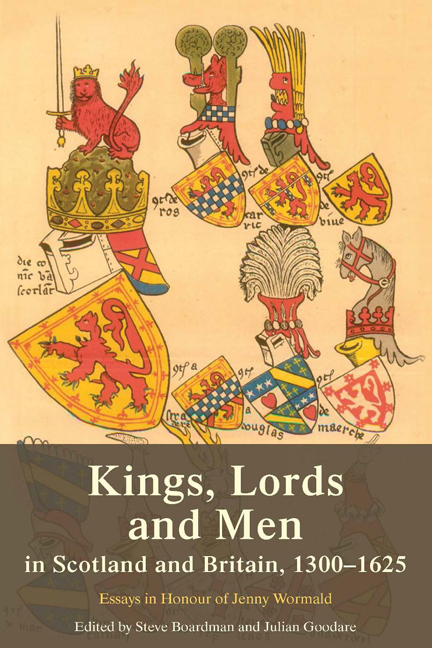Book contents
- Frontmatter
- Contents
- List of Illustrations
- Preface
- List of Abbreviations
- List of Contributors
- Introduction: Kings, Lords and Jenny Wormald
- 1 The Stewart Realm: Changing the Landscape
- Part I Lords and Men
- 2 Lords and Women, Women as Lords: The Career of Margaret Stewart, Countess of Angus and Mar, c.1354–c.1418
- 3 Bastard Feudalism in England in the Fourteenth Century
- 4 Tame Magnates? The Justiciars of Later Medieval Scotland
- 5 King, Lords and Men in Renaissance England: The Poetry of John Skelton
- 6 Rethinking the Justice of the Feud in Sixteenth-Century Scotland
- 7 Bonding, Religious Allegiance and Covenanting
- 8 ‘We Bund and Obleiss Us Never More to Querrell’: Bonds, Private Obligations and Public Justice in the Reign of James VI
- Part II Kings and Lords
- Publications of Jenny Wormald
- Index
7 - Bonding, Religious Allegiance and Covenanting
from Part I - Lords and Men
Published online by Cambridge University Press: 15 December 2017
- Frontmatter
- Contents
- List of Illustrations
- Preface
- List of Abbreviations
- List of Contributors
- Introduction: Kings, Lords and Jenny Wormald
- 1 The Stewart Realm: Changing the Landscape
- Part I Lords and Men
- 2 Lords and Women, Women as Lords: The Career of Margaret Stewart, Countess of Angus and Mar, c.1354–c.1418
- 3 Bastard Feudalism in England in the Fourteenth Century
- 4 Tame Magnates? The Justiciars of Later Medieval Scotland
- 5 King, Lords and Men in Renaissance England: The Poetry of John Skelton
- 6 Rethinking the Justice of the Feud in Sixteenth-Century Scotland
- 7 Bonding, Religious Allegiance and Covenanting
- 8 ‘We Bund and Obleiss Us Never More to Querrell’: Bonds, Private Obligations and Public Justice in the Reign of James VI
- Part II Kings and Lords
- Publications of Jenny Wormald
- Index
Summary
In her seminal book Lords and Men, Jenny Wormald achieved the important double that great historians accomplish. She both dealt superbly with a particular body of evidence and also revealed an entire world and guided the reader into it and around it. By opening up this new territory of lords, men and their bonds Jenny has given those who follow in her footsteps a chance to explore, to find exciting paths to travel and to discover new ways of examining familiar landmarks. Although the second achievement has probably overshadowed the first one, her classification and explanation of the actual bonds has received the accolade of being silently absorbed into the standard accounts and becoming part of the ‘givens’ for understanding Scotland during the late medieval and early modern period. These days the categories of bonds of maintenance, manrent, friendship and political and religious bonds can be found in historical discussions from school essay to specialist article. This exploration will start with Jenny's list of ‘religious bonds’ and chart how conventional bonds grew into a new type of bonding expressing a profound sense of religious allegiance and identity and flowing into the covenanting tradition.
As Jenny demonstrated, a bond of maintenance reflected the perspective of the ‘lord’, usually a noble overlord or feudal superior. It detailed how the lord viewed his relationship with his ‘man’ and in particular what he would be doing to ‘maintain’ his ‘servitor’. The Dictionary of the Older Scottish Tongue (DOST) defines ‘maintenance’ as:
backing, support, protection, granted by, or due from, one person to another, his dependants, possessions etc. … As by a lord to his man, one ally to another … Also band, letter(is) of maintenance, a formal contract of such backing or protection.
Bonds of maintenance were typically made up of four discrete sections. First, the preamble explained that it was the ‘bounden duty’ of the lord to help his man. Second came the promise to apply power and strength and ‘very lyves’ in support of the particular people who were named or identified. Third, the actual maintenance clause contained the promise to ‘mantene, nuryss and defende’. Finally, as befitted a legal document, came the subscription by the parties to the bond, along with witnesses, date and place.
- Type
- Chapter
- Information
- Kings, Lords and Men in Scotland and Britain, 1300-1625Essays in Honour of Jenny Wormald, pp. 155 - 172Publisher: Edinburgh University PressPrint publication year: 2014



